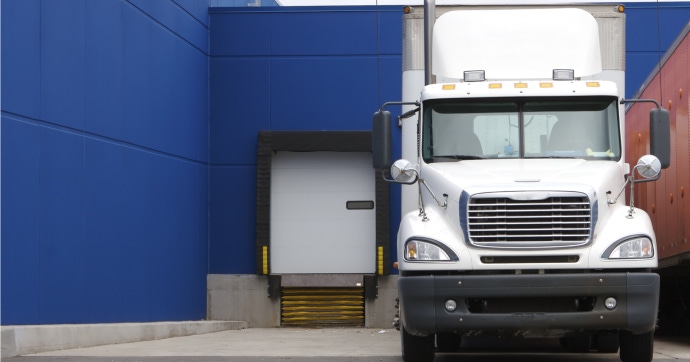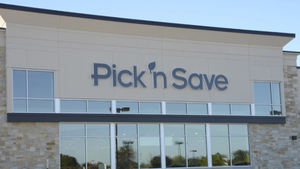Consumer Brands CEO: 'This Is an Emergency Situation; It’s Time to Treat It as Such'
'Being so passive about inflation is a risky venture,' says Geoff Freeman. Geoff Freeman, president and CEO of the Consumer Brands Association, talks about the changes that the CPG trade group wants to see to address supply-chain bottlenecks—and the "risky venture" of being passive on inflation.

Earlier this week, the Consumer Brands Association announced a new policy platform, Deliver America, that calls for a host of federal reforms and investments in manufacturing and transportation to help ease supply-chain bottlenecks. The CPG trade group also reiterated its call for a federal office of supply chain, which CBA President and CEO Geoff Freeman says is necessary to create an "air-traffic control" system to monitor and better manage U.S. supply chains.
In an interview with WGB, Freeman discussed the danger he sees in taking a hands-off approach to inflation as both consumer and producer prices climb and the specific measures that CBA believes can create meaningful supply-chain change, quickly.
Christine LaFave Grace: You've said repeatedly this spring and summer that CPG companies are facing a "perfect storm" of rising costs and increased demand, and last week, you asked, "How many records need to be set before we accept the economic realities we are facing?" What actions would Consumer Brands like to see immediately? What changes do you see as being able to make the biggest impact the most quickly to alleviate supply-chain challenges?
Geoff Freeman: The Biden administration has come in and done a number of good things, a number of things that we’ve been quite positive about, whether it’s funding included for an Office of Supply Chain within their infrastructure package, whether it’s the way that they’ve been assertive in other aspects—certainly a lot of the work around the vaccine has been very impressive.
Our disappointment at this time would be with the relatively hands-off nature with the inflationary environment. It’s almost as if Washington, whether it be the White House or Congress, feels that this is an act of God that is beyond their control, when in actuality this is an environment that has largely been created by public policy.
Public policy can play an important role in, as we've said, letting some steam out of what is an overheating engine. We’re not going to solve the problem, but we certainly could help the economy or help the inflationary environment to cool off. How do we do that? A lot of these things can be done by the administration. A lot of these things don’t need Congress. To put a newfound focus on America’s ports, where products are stacking up because of a delay in inspections, delays because of understaffing, delays in a host of other areas—making the ports a priority is something the administration can do today and demonstrate results in a matter of days.
When we look at some of the outdated trucking rules that are in place, there are things that can be addressed by executive order. At the outset of COVID, we took a number of emergency measures around trucking in terms of hours of service, truck weights and other things. We're in an emergency situation right now. Every CEO I talk to in the industry is ringing the alarm bell when it comes to the inflationary environment, the fact that they’ve never seen a perfect storm like they see today with ingredients, materials, transportation, labor, all of these things striking at the same time. That environment’s never been seen before, and the message from industry to Washington is, "This is an emergency situation; it’s time to treat it as such." And we have not seen that urgency.
Being so passive about inflation is a risky venture. I think it’s particularly risky for an administration that will be held accountable if this inflation doesn’t get in check.
There are some areas where we can make some meaningful short-term changes. You look at what’s happening in the marketplace right now—our industry is back to full employment from where we were before COVID started, but nondurable manufacturing is seeking to hire about 400,000 jobs that we can’t fill right now. Some states are taking some important steps in terms of pulling back on the supplemental benefits that were put in place; perhaps we need to see more urging of that nationwide.
Holding our breath and waiting can be a dangerous strategy. That isn't to say that there aren’t aspects of this [inflationary environment] that may be transitory. We have begun to see some decreases in some areas. Just last week people were celebrating that lumber prices were coming down, and yet today, I'm reading about how lumber prices might skyrocket because of the forest fires in Western Canada. So maybe we celebrated too quickly.
Speaking of celebrating too soon: Does the spread of the delta variant create a higher sense of urgency for tackling some of these changes you seek?
The pace of change is amazing, right? The emotional roller coaster we're all on in terms of mask wearing, in terms of thinking we’re on the other side of this—the speed at which that changes is remarkable. A week ago the coverage of the delta variant was there, but the nervousness probably wasn't where it is today. Yes, I do think further uncertainty should lead to greater urgency. Is the delta variant going to lead to increases in demand, more people hunkering down? Is it going to lead to a decline in out-of-home food consumption, a decline in travel that really brings more of those activities back into the home and puts further stress on an already burdened supply chain? I'm surprised and disappointed by the passive approach to what is an emergency situation.
Federal Reserve Chair Jerome Powell has struck a stay-the-course, keep-calm-and-carry-on tone about inflation; he reiterated to Congress last week the message that some of these pressures are temporary as the economy continues to get back up to speed and that because the Fed wants to see inflation averaging 2% long term, it's OK for it to run moderately higher now to make up for the stretch when it ran below that target. What was your reaction to his comments?
Even if the Fed is correct that these things will be transitory in nature, two comments on that: One, we’re still in an emergency now that we can do things about. It's not acceptable to just wait. That's not a strategy. And No. 2, the price increases that are being negotiated with retailers are coming into the market the latter half of this year, the early part of next year. There's a lag there that if you don’t address this, even if you get inflation under control down the road, it's going to be too late to deal with the price increases that consumers are absolutely going to feel.
What strikes me is the diversity of products that are affected. We all know that corn is up; we all know that oils are up. But then to see it in the resin that goes into the trash bags and other aspects of plastic. To see it in the aluminum scrap, to see it across the board, that is what is so striking.
This industry does everything it possibly can to manage costs and keep prices in check. And I couldn't be more amazed in watching that. What we're seeing, though, and what we're hearing is that there is a breaking point. And that breaking point is being reached. When you hear General Mills and Conagra and Unilever and Procter & Gamble and others be so public about what is coming, that should be a wake-up call that unfortunately Washington doesn't seem to be heeding.
To people who would say that a federal office of supply chain isn’t necessary or just creates another layer of bureaucracy, how would you respond?
My response is that we had a wake-up moment during COVID. The words supply chain were spoken at kitchen tables across this country. We are now more aware than we’ve ever been before what it takes to get product to market and just how complex that is. Unfortunately, at a federal level, we have no strategy when it comes to our supply chain. We have no understanding on a day-to-day basis of where the obstacles are, where the challenges are, how we can make our supply chains more efficient.
We need some type of air-traffic control that is looking over the supply chain if we're going to protect the American consumer, if we're going to ensure that people get the product that they want, where they want it, when they want it, at the price they want it, it takes some degree of coordination. Industry is doing all they can; it's time for government to be a partner. Interoffice coordination is nice. It doesn't get the job done on something as important as building a streamlined supply chain. This should be one of our nation's top priorities.
In consideration of all of this, how optimistic are you?
I applaud the Biden administration for immediately recognizing the need here on supply chain. I am optimistic that we’re going to get some important things done with an infrastructure package. I am proud of the conversations we're having with the Biden administration on a number of issues that they’re leaning into. I think they get it—I'd like to see more urgency, but I think they get the need in some of these areas. I'm generally optimistic. In my experience, a lot more gets done in Washington than people realize, and I think we’ve got things working in our favor.
There is a need to work with our industry, and that it something that is increasingly recognized on all sides of the aisle.
About the Author
You May Also Like






